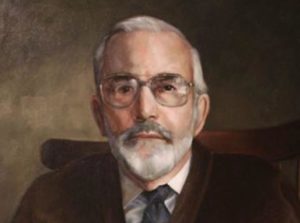Dr. Warren Woolsey, professor emeritus of the Department of Religion and Philosophy at Houghton College, passed away on Christmas Eve last year. He was 95 years old.
Dr. Woolsey’s life and legacy ranged across continents. He was born in Marion, Indiana on April 2, 1922, the son of Pierce and Mildred Woolsey. “He was raised in a very straight-laced Christian home, rejected it, and later came back to faith,” his son, Dr. Stephen Woolsey, remembered.
Pulled away from his studies at Houghton by active service training as an Air Cadet, he graduated in absentia in the year 1942. His squadron conducted 30 missions throughout southern Germany, occupied Austria, and Italy’s Po River Valley.
Later in life, this period of military service became a touchpoint of emotion. According to Woolsey, his father was “basically, increasingly, a pacifist. He knew that innocent and guilty people alike had died. He never talked about it…I know it was disturbing to him.” Regardless, a conviction that his role in the war had been necessary, given the cruelty of the Nazi regime, remained with him for the rest of his life.
After the war ended, Dr. Woolsey briefly attended Columbia University. Scholasticism later gave way to missions, as he and his wife moved from the halls of the seminary to the Appalachian Mountains of Kentucky. By 1950, they were living in Sierra Leone and wholeheartedly dedicating themselves to evangelism and education. After moving to Freetown, Sierra Leone, Dr. Woolsey took up a position as the first president of the institution now named as the Evangelical College of Theology. After returning to the United States in 1966, Dr. Woolsey joined the Houghton College Religion and Philosophy Department to teach classes in New Testament Theology, Christology, and missiology.
The well-known Bible scholar was intensely private man, who not only maintained a steady devotion to personal virtue and cared deeply for his students, but also grew to reject some traditional conventions. “He was such a true introvert,” Woolsey shared, “but he gave everything he had to give. Since he died, so many people have sent cards saying ‘Your father helped me through such a dark time.’ He had a kind of availability to his students.” On Facebook, former students described the elder Dr. Woolsey as a “sweet, godly gentleman” who changed lives through his “incredibly kind and generous” scholasticism.
 That integrity also manifested itself in a rare sense of administrative dignity. “In faculty meetings where feelings were flying,” Woolsey said, “he would quietly stand up and make a pronouncement that clarified things and allowed faculty to reach a conclusion they could all live with.”
That integrity also manifested itself in a rare sense of administrative dignity. “In faculty meetings where feelings were flying,” Woolsey said, “he would quietly stand up and make a pronouncement that clarified things and allowed faculty to reach a conclusion they could all live with.”
“Another thing is, he was pretty traditional when it came to gender roles,” Woolsey said. “For most of his life, probably, he was ambivalent about women in ministry and in positions of leadership. But when my sister came along, and was exploring her own vocation in ministry and graduate education, he started giving her books that we would now view as very positive studies of Christian feminism. By the end of his life, he was not just accepting of, but a huge advocate for, women in all kinds of leadership, whether scholarly, ministerial, or political.” Woolsey also remembered a time when Dr. Woolsey agreed to serve as faculty advisor to a controversial theatrical performance, which pointed out hypocrisies in the church and had drawn the ire of some administrative staff.
“He had this deep integrity,” said Woolsey, who remembered his grandmother’s daily admonition: “The honor of the family is at stake.”
“A while ago, for some reason, I was assigned to an Honors interview in the seminar room where his painting was hanging,” Woolsey said. “I was doing this interviews with Dad literally looking over my shoulder, it was sort of an extension of that mentality. Remember…the honor of the family is at stake.”
